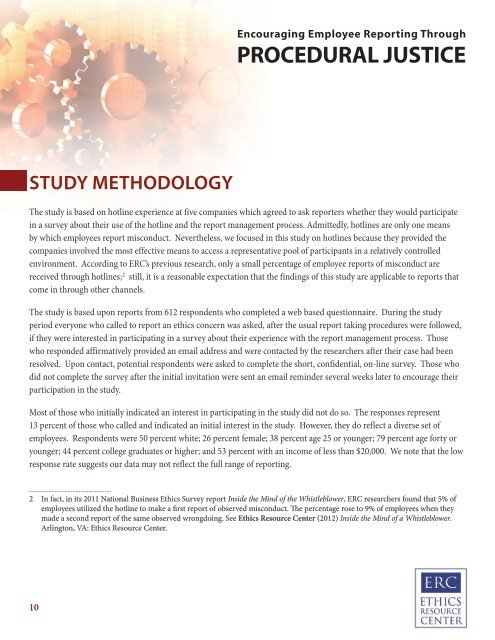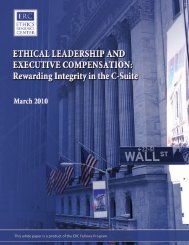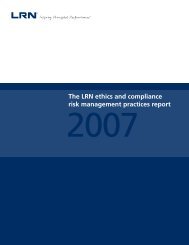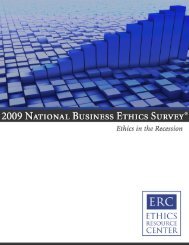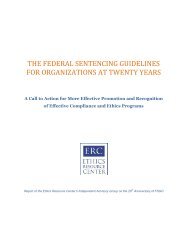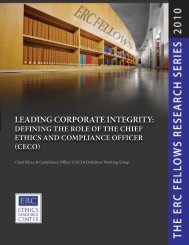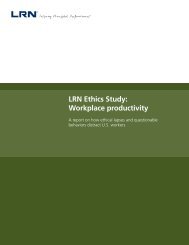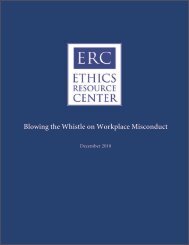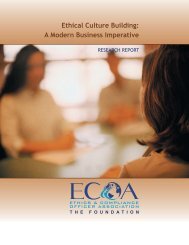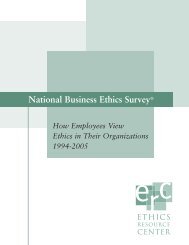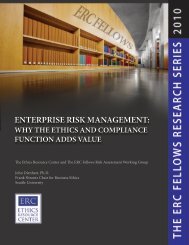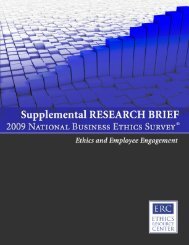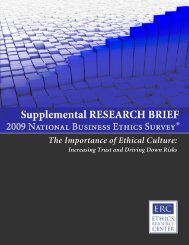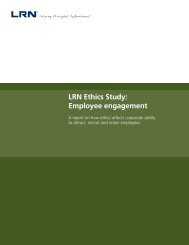PROCEDURAL JUSTICE - Ethics Resource Center
PROCEDURAL JUSTICE - Ethics Resource Center
PROCEDURAL JUSTICE - Ethics Resource Center
You also want an ePaper? Increase the reach of your titles
YUMPU automatically turns print PDFs into web optimized ePapers that Google loves.
Encouraging Employee Reporting Through<br />
<strong>PROCEDURAL</strong> <strong>JUSTICE</strong><br />
STUDY METHODOLOGY<br />
The study is based on hotline experience at five companies which agreed to ask reporters whether they would participate<br />
in a survey about their use of the hotline and the report management process. Admittedly, hotlines are only one means<br />
by which employees report misconduct. Nevertheless, we focused in this study on hotlines because they provided the<br />
companies involved the most effective means to access a representative pool of participants in a relatively controlled<br />
environment. According to ERC’s previous research, only a small percentage of employee reports of misconduct are<br />
received through hotlines; 2 still, it is a reasonable expectation that the findings of this study are applicable to reports that<br />
come in through other channels.<br />
The study is based upon reports from 612 respondents who completed a web based questionnaire. During the study<br />
period everyone who called to report an ethics concern was asked, after the usual report taking procedures were followed,<br />
if they were interested in participating in a survey about their experience with the report management process. Those<br />
who responded affirmatively provided an email address and were contacted by the researchers after their case had been<br />
resolved. Upon contact, potential respondents were asked to complete the short, confidential, on-line survey. Those who<br />
did not complete the survey after the initial invitation were sent an email reminder several weeks later to encourage their<br />
participation in the study.<br />
Most of those who initially indicated an interest in participating in the study did not do so. The responses represent<br />
13 percent of those who called and indicated an initial interest in the study. However, they do reflect a diverse set of<br />
employees. Respondents were 50 percent white; 26 percent female; 38 percent age 25 or younger; 79 percent age forty or<br />
younger; 44 percent college graduates or higher; and 53 percent with an income of less than $20,000. We note that the low<br />
response rate suggests our data may not reflect the full range of reporting.<br />
2 In fact, in its 2011 National Business <strong>Ethics</strong> Survey report Inside the Mind of the Whistleblower, ERC researchers found that 5% of<br />
employees utilized the hotline to make a first report of observed misconduct. The percentage rose to 9% of employees when they<br />
made a second report of the same observed wrongdoing. See <strong>Ethics</strong> <strong>Resource</strong> <strong>Center</strong> (2012) Inside the Mind of a Whistleblower.<br />
Arlington, VA: <strong>Ethics</strong> <strong>Resource</strong> <strong>Center</strong>.<br />
10


